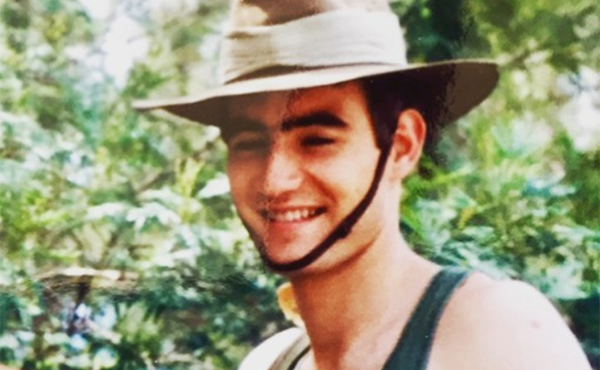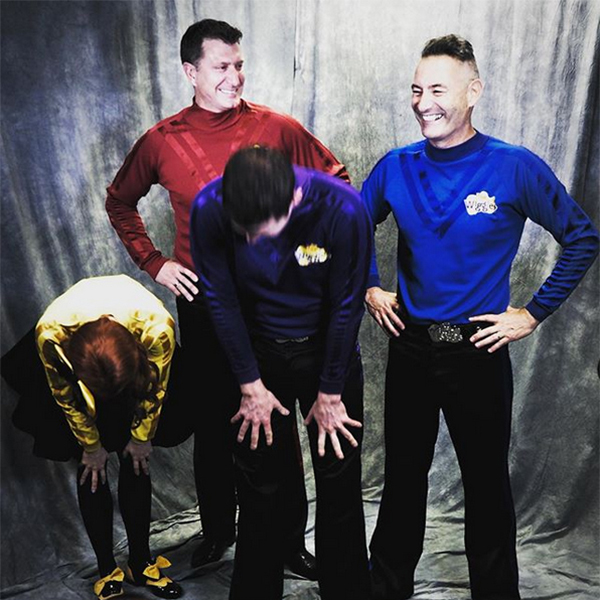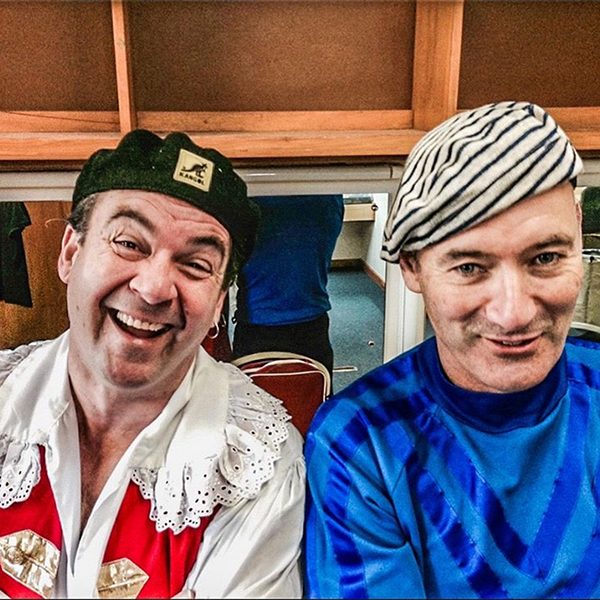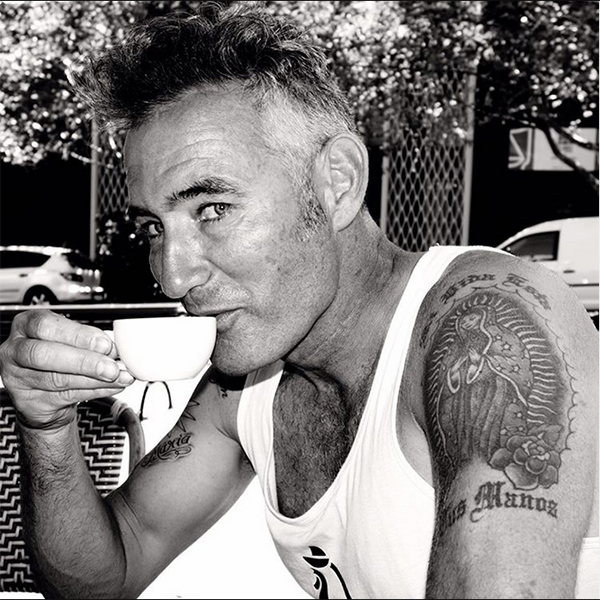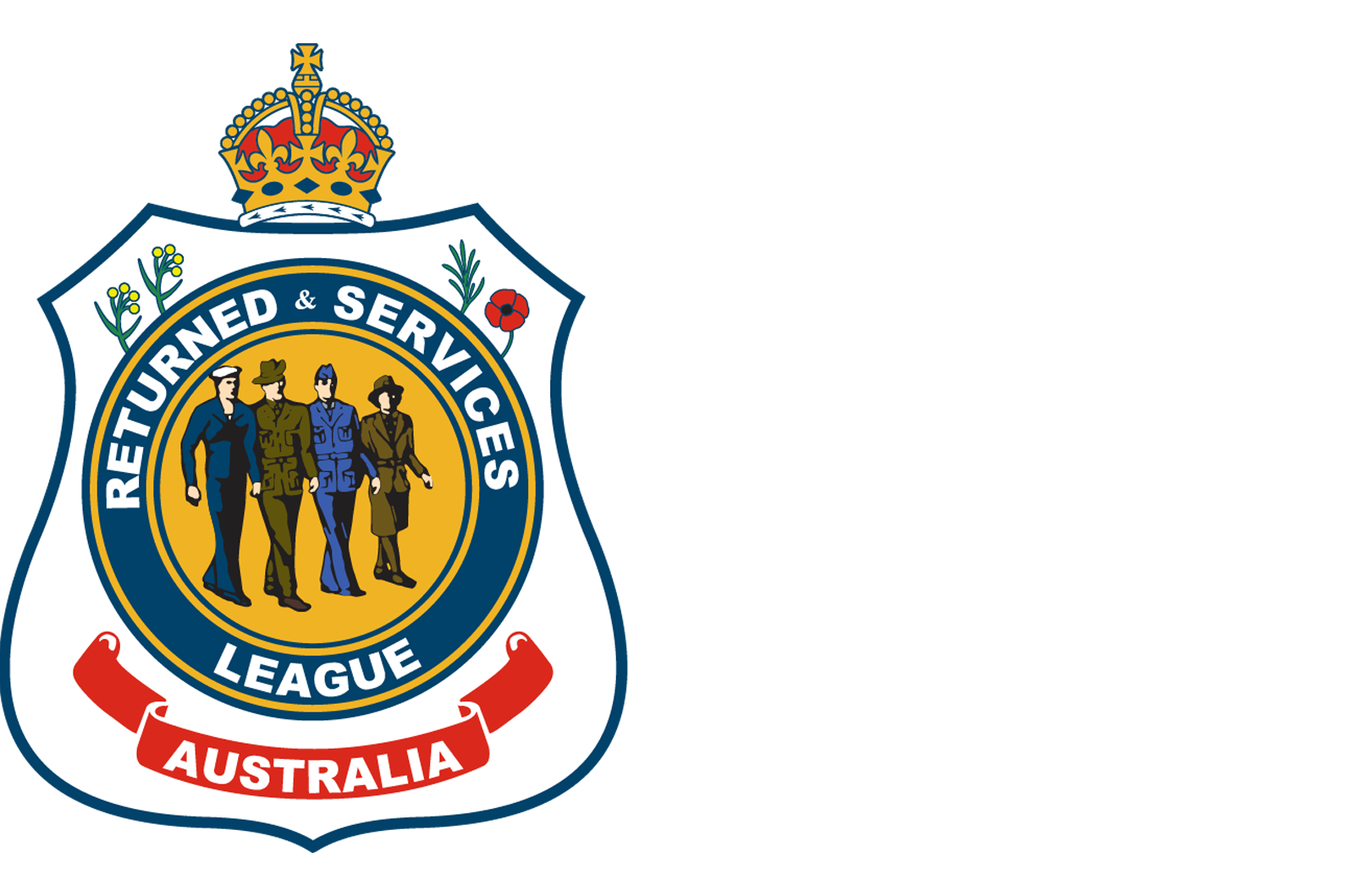5 November 2020
Burnouts in the Big Red Car
It’s 1982, and Anthony Field is lying in bed, not sleeping. He’s staring through the open door into the dark hallway. He has no idea what time it is, as he doesn’t have a watch. He’s not allowed to have a watch. He can hazard a guess, though. He’s started waking up at the same time every morning, a few minutes before they call “hallway”. He’s not alone. He can hear people quietly shuffling in the other rooms. Almost everyone in the platoon is already awake, looking out into the hallway from their rooms, waiting.
Bink-bink-bink. Fluorescent lights blink on in the hallway, garishly bright. A man’s voice booms – “Hallway 26!”
“Hallway 26!” Field yells in response, in almost perfect unison with dozens of other male voices. He leaps up out of bed, jamming his feet into a pair of waiting thongs, and violently wrenching the white bedsheets off the mattress. He throws one over his left shoulder, and one over his right, and sprints out the door, hooking to one side and standing with his back to the crème-coloured wall. His roommates do the same. Up and down the hallway, bleary-eyed recruits erupt from their rooms and line up along the walls in the same fashion, sheets dangling like capes. They stand with heels together and eyes forward, trying not to antagonise the severe-looking corporal in green fatigues standing in their peripheral vision at the end of the hall.
From raw recruit...
Anthony is 18, and a recruit at Kapooka, basic training for the Australian Army. It’s an intense, alien world, full of seemingly absurd rules, ferocious discipline, and a lot of yelling – but it beats the hell out of boarding school in Sydney. If you told Recruit Field that 28 years later, he would be a household name and be made a Member of the Order of Australia for his services to children, he probably would have told you that you were dreaming.
Remembering basic training while at his home in Gladesville, NSW, Anthony laughs. “There wasn’t any political correctness going on in those days. I’ve heard it’s different now. It was pretty rough back then, but I guess it had to be. No complaints, but it was pretty wild!
“When we were going through, we had a lot of veterans from Vietnam, who had never had any psychological help. There were a lot of men who were suffering a bit. Some of them had some issues that needed dealing with, and there was the occasional butt-stroking going on with the corporals!” 'Butt-stroking' is a rather placid way of describing getting whacked with the stock of a 7.62mm semi-automatic rifle, a form of instilling discipline that is thankfully in the past.
“The whole time I was in the Army, I had nothing but respect for the NCOs [Non-Commissioned Officers], the soldiers I was with. I had come from boarding school, which was really rough … I just liked, when I was in the Army, that people were upfront. I really enjoyed my time in the Army. It was so good, yeah.”
After basic training, next stop was the School of Infantry in Singleton, NSW, where he learned how to be a grunt, training in the use of machine guns, rocket launchers and grenades. “I remember the lines [dormitories] there. This sounds a bit crude … there were no toilets in the actual lines, where we were, so guys would just open up the back door … The sergeant saw that all this grass wasn’t growing out the back of our lines. He put two and two together, and we got in a bit of trouble for it all!”
After qualifying as an infantry soldier, he was posted to 5/7 RAR at Holsworthy Barracks, Sydney. Long before the Big Red Car, Field was trained to drive M113 Armoured Personnel Carriers – boxy, tracked vehicles armed with .50-caliber heavy machine guns – and was also employed as a ceremonial bagpiper in the Pipes & Drums section. He wound up deploying to a divided Germany in the height of the Cold War, an experience which he remembers fondly. “I loved it, mate. The [Berlin] Wall had not come down yet, and what we went over for was, there were, I think, four or six unmarked graves, but they discovered that they were Australian soldiers, and we went over. We did an exercise with the NATO forces, and we commemorated the graves of these unknown Aussies. It was very moving to be over there. The exercise we were in was absolutely insane, because at the time, the Cold War was on, so it was really serious. The equipment they had, compared to what we had in Australia, was mind-blowing. They were on the Leopard III or IV, [and] we were driving these old Centurion tanks. It was just crazy, seeing the technology that the world had.”
It’s strange to think that one of Australia’s most beloved children’s entertainers was once a heavily-armed soldier – what drew him to the infantry? “I basically couldn’t get in as anything else,” he laughs. “I was really happy to be a rifleman.” His service is something that he’s proud of. He takes part in ANZAC Day every year.
...To household name
Most of my friends with kids lost their minds when I told them I had landed an interview with Anthony, and with good reason. For people who were either children or parents from the 90s onward, Anthony and The Wiggles have been part of the furniture. Does he get recognised all the time? “Yeah, but 99.9% is so positive. People just want to say 'hello' … or they say, 'Where’s Emma?' [Laughs] Mate, it’s a nice part of life. I’m nearly sixty now, so it’s nice [when people say] 'You were part of my childhood!' It’s nice to hear. So I’m really happy for people to come up. If I’m having dinner in a restaurant, I don’t care. Come and say 'hello.'”
I mention that, for all the big interviews that I’ve done, he is the most commercially successful. “We’ve done, I think it was 26 million DVDs, and 12 million CDs or something, so it’s quite a lot.” The Wiggles are the third biggest selling group Australia has ever produced, beaten only by AC/DC and Kylie Minogue. “We had some amazing success in the States. Yeah, it was pretty pinch-yourself stuff. It was a lot of fun.”
Having a constantly regenerating audience doesn’t hurt. There are future Wiggles fans being born right now. “That’s true, but you’ve got to be still producing the goods constantly. Every three years there is a new audience, but I always say, if you do a show, a concert, that the whole family love, they’ll come back next year and the year after. A lot of children’s shows come along, and the family will go once, but they won’t go again, because they only need to see it once. With The Wiggles, we always try to make the show a really different experience, and a really great experience for whoever comes along. I went and saw Play School with my kids, and Angelina Ballerina, and I still remember it was the most beautiful thing to be there with your little preschool kids, and they’re having a great time. I note the responsibility; we’ve got to make it a really good show for people coming along.”
The Wiggles empire has a carefully crafted image that they go to great pains to maintain. It’s telling that the biggest controversy they’ve had to weather in almost 30 years was the replacement of an ex-member. They’ve even handled two members getting married, then divorced, with a quiet dignity that is honestly rare (and they still work together). I’ve never once heard of a member getting drunk or misbehaving in public. Is this something that gets drummed into people when they join?
“It’s funny, Emma, Lachy and Simon, I don’t think we ever read the Riot Act to them. They’re just nice people. I think the golden rule for us is to respect our audience. Respect children – never make a joke about children, or the parents. Just respect the people coming to see us. What you do in your own time, as long as it’s legal, and you’re not harming anyone, that’s your own business. I think, when you’re part of The Wiggles, we’re really strict about respecting the different abilities in our audience, and try to be inclusive of everyone, and just make The Wiggles a nice, safe place for children and families to come and be entertained.”
Is it true that the Wiggly hand gestures served a dual purpose, in that they ensured that their hands were always visible when posing for photos with young fans?
“You’re exactly right. The gesture, we came up with ourselves as a bit of fun, but John Edwards is a psychic from America – he’s a great mate of ours. He actually said, 'When you get your photo taken, have your hands [visible] so that you’re above suspicion.' It’s a sad world that you have to do that … It’s become our trademark anyway.”
When I mention that I’m in Brisbane, Field points out two members of the Wiggles family that hail from Queensland – current purple Wiggle Lachlan Gillespie, and Paul Paddick, more famously known as the impossibly energetic Captain Feathersword. Giddy, loud and about as subtle as Chinese firecrackers going off under your pillow, Paddick has been with them since the beginning. Where on earth did they find him? “He’s incredible. When The Wiggles first started, I had a flatmate who turned out to be Paddy’s girlfriend, and this guy would come into the house every night after he was doing West Side Story. He’d talk about what happened onstage, and I would be in stitches. Every night, that guy had me laughing. Anyway, I got a hernia and I couldn’t do the shows, and I said to him, 'Paddy, you’ve got a break from West Side Story, can you cover for me?' So he became me and Captain Feathersword. He is the greatest. He’s exactly like he is onstage.” Paddick would become kindred spirits with another hyperactive Australian icon – the Crocodile Hunter himself, Steve Irwin. “Those two got on like you would not believe, because they’re exactly the same.”
What was Steve like?
“We hit in America around the same time [as Steve]. We did the Macy’s [Thanksgiving] Day Parade together, and we were on a lot of flights together. We filmed a video together, and stayed up at Steve’s place for two weeks. He used to go around Australia Zoo in a disguise. He would put on Billy Bob teeth and a wig, and that was the only way he could get around. He was so popular. People loved him. Of course, it broke everybody’s heart when he passed. I was honoured to be the MC at his funeral. I still get upset about the passing of Steve. He went far too early.”
A private battle
Anthony very nearly had to attend the funeral of another person close to him. Earlier this year, the original Wiggles played some licensed shows for their grown-up fans, with all the proceeds going towards recovering from the shocking bushfire season. All appeared to be going well, until Greg Page, the honey-voiced yellow Wiggle, suddenly face-planted and went into cardiac arrest. Some quick-thinking bystanders saved his life. What did this experience teach Anthony about life, and the people around him?
“I’ve got post-traumatic stress – not from the army, I got it from boarding school – and I really got triggered when I saw Greg … he basically died in front of us. They brought him back, thank god. Jeff had actually had a heart attack a couple of years before as well … I don’t know what to say about it, mate. I couldn’t believe it happened to Greg. He is the youngest of us – I’ve known him since he was a kid. He was like a baby brother to me … It was just dreadful. I didn’t take it too well … It just teaches us that it can happen to any of us. Just a horrible thing to experience, yeah.”
Anthony’s struggles with mental health issues are well documented since he first went public about his battles with depression in 2007. 2020 has been a shocking year for many, and The Wiggles were not immune. Eighty per cent of their business comes from touring, where they would perform multiple shows a day. How has he been holding up?
“I had a shocker about two months ago. It’s a long story, but I got bit by bush lice in the army, and I got taken to hospital, and 35 years later I got meningitis, and I got diagnosed overseas with Lyme disease … I have what’s called a Bartonella, which is cat scratch [disease], and that gave me meningitis, and recently I thought I had dementia.” Field has been on Sertraline, an antidepressant commercially known as Zoloft, for many years. “I started forgetting sentences, I forgot where I was going. I was in a really bad way. This was about three months ago. I went to the doc, and he got me an MRI, and I found out that I had encephalitis – my brain was swollen – and also had asphyxia; oxygen wasn’t going to the brain. I was in a really bad way. So he actually took me off the antidepressants and did all this therapy, which has actually helped me.” This feels like a rough year to be taken off antidepressants. “For the last eight weeks or so, I’ve been off antidepressants, and I have been crying … 20 times a day. I’m just starting to get better. It just showed me that, mate, sometimes it’s out of your control. Someone would tell me something and I would start bawling my eyes out.”
“I think I’m going to be better in the long run. The swelling is coming down. I’ve got to get another MRI done. My headaches aren’t happening as bad. I’m not crying as much – I’m crying about once or twice a day, instead of twenty times.”
I mention that he and I came off antidepressants within a few weeks of each other, and we talk about his experiences with Zoloft. “You know what it does? It keeps you in the moment so much that you don’t get motivated, so you don’t exercise. You don’t get real highs, and you don’t get real lows. It stops you thinking about the terrible solutions that you might’ve thought were good solutions.”
The music and entertainment world has had a rough couple of years when it comes to beloved people choosing those terrible solutions. Keith Flynt, Chris Cornell, Chester Bennington, Anthony Bourdain – if we can learn anything from them, it’s that success, while a great thing, does not protect you from your own mind. Depression doesn’t care who you are, or how much money you have in the bank. “One of my brothers – I’m not having a go at him – I was depressed, and he laughed at me. He said, 'What have you got to be depressed about, mate?' I was like, yeah, you’re right, we’ve had so much success and it’s great. It’s just a physical thing, you know? On the other side of things, I don’t mind talking to people like yourself about it, but sometimes we get requests to our office saying, 'Can Anthony come and talk about mental health?' And I never accept it, because I don’t know the answers. I’m not an expert – I’m just part of the equation, you know? I’ve got no advice for anyone, except just listen to yourself, or get help, talk to someone. I’ll never go and speak about it, because I’m not an expert.”
Outside of his wife and kids, who are some of the people he leans on for support? “The most solid friendships I’ve ever had have been my army mates. They all stayed on way longer than me. A fella up in Brisbane, Kenny Holmes, he writes to me every day, and he says, 'Private Field, how are you?' He writes every day to me, and some days I can’t write because I’m in a bad way, but at the moment I’m doing really well. He’s just found out that he’s got MS and dementia coming on, and we had a good laugh about it, because I thought I had dementia. We were having a bit of a laugh that none of us are going to remember the conversation! [Laughs] Even if you can’t handle speaking to someone who is obviously depressed, just write – 'How are you doing mate? Are you okay?' It does help, you know?”
If you see Anthony running or working out, you’ll probably notice the tattoo of the Virgin Mary on his left arm. I asked him about his Catholic faith, and was slightly surprised by the answer. “Honestly, I’m sad to say that I’ve let it all go lately, over the last couple of years. With religion, I’m really accepting of everybody, and I know God’s there and everything like that. But at the moment I’m not too much of an advocate for anything at the moment.”
Did faith help back when he first had mental health struggles?
“Early on, I was very devout. I didn’t even know I had mental health struggles. I was in the midst of drinking a lot and gambling. I was doing everything to stop myself thinking about myself, and how bad I felt about myself. Of course, I prayed all the time. My dad got me to a psychologist. That was in my early 20s. I was pretty [badly] suffering in my early 20s, just with a real self-doubt/self-hatred thing going on.”
Does alcohol play much of a role in his life these days? “Since I got encephalitis, I haven’t touched a drop in probably three months now. I’m not an alcoholic – I can drink or not drink – but for health reasons I haven’t touched a drink now for three months. It’s really helping me at the moment. Since I’ve given up the grog, and given up the anti-depressants, I’ve lost six kilograms, and I’m going to keep going with it, mate. I’m trying to get back, you know?”
I have been a parent for six years, and The Wiggles have been a big part of my home, as I’m sure they have been for a lot of you. Don’t worry, I asked – can you do a burnout in the Big Red Car?
“We did a movie a few years ago, and it was a Volkswagen that they converted, and Greg did one of those handbrake turns, whatever you call it. I think that’s a burnout, isn’t it?” He laughs. “Yeah, we’ve done a burnout, and there’s some footage of it. Somewhere, someone’s got it.”
RSL Queensland and Mates4Mates stand ready to support all veterans who are experiencing the impacts of their service. If you or anyone you know needs assistance, please reach out to us on 134 RSL, or Open Arms on 1800 011 046.

